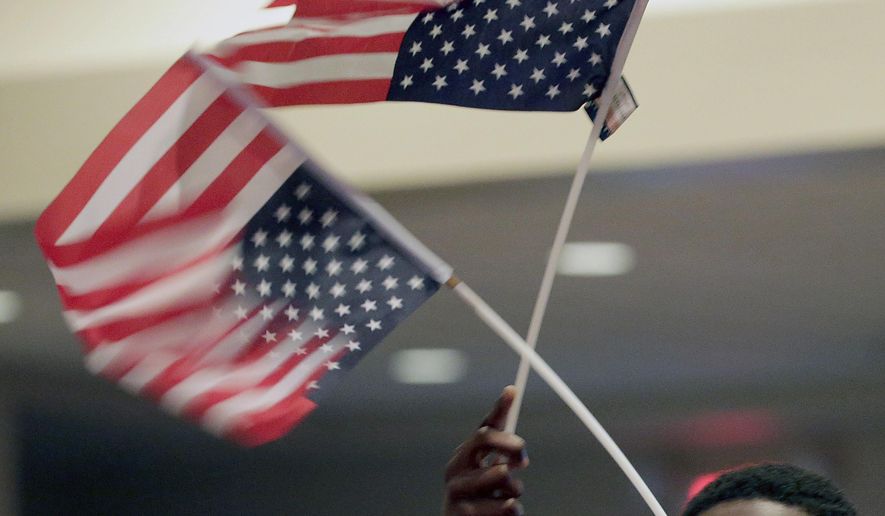God created the universe in six days, but it took an act of Congress to get Him into the Pledge of Allegiance.
The history of the Pledge is dotted with revisions, including the 1954 adoption of “under God.” And though Americans have said the Pledge the same way for the past 60 years, a survey from the American Humanist Association found that one-third would like “under God” removed, after being told those words were not part of the original text.
A May 29 online survey of 1,000 Americans conducted for the American Humanist Association found that 34 percent said “under God” should be removed, and 66 percent said they should remain, after being told those words were added to the original version.
“There’s a lot more we could have said,” said Roy Speckhardt, executive director of the American Humanist Association. “We could say more about the history, that it was clearly an effort by the government at the time to endorse a Judeo-Christian perspective in its proceedings. If that happened today, people would be up in arms. The government should not be endorsing religion in any way.”
Of the 1,000 respondents, 666 identified themselves as Christian, and 123 as followers of other faiths. Unaffiliated persons accounted for 211 respondents in the survey, which has a margin of error of plus or minus 3.1 percent.
The Humanist Association survey, conducted by the Seidewitz Group, was carried out as a secular version of a poll conducted by LifeWay Research last September that found that 8 percent of Americans would want “under God” removed from the Pledge.
SEE ALSO: Higher Ground: Sexy and godly
The LifeWay phone survey asked 1,001 Americans whether they thought forcing school children to say “under God” violated their rights and whether they wanted “under God” removed from the pledge.
Respondents were not told those words were not part of the original Pledge written by Francis Bellamy in 1892.
“Most Americans have recited the pledge hundreds of times and are not inclined to memorize a different pledge,” said Scott McConnell, director of LifeWay Research. “Changing it may just feel wrong. Most Americans say they believe in God or a higher being and feel comfortable having ’under God’ in the Pledge.”
The humanist association’s survey results, Mr. Speckhardt said, show that with “a little bit of education, we can bring people a little bit in our direction.”
But the problem with the humanist survey is that survey it failed to be factual, said Eric Rassbach, deputy general counsel at the Becket Fund for Religious Liberty.
“What they’re trying to say … is that the Pledge was somehow unchanged for 62 years, then changed in 1954,” Mr. Rassbach said. “And they’re sort of playing in to this idea that America in the 1950s was retrograde. That’s the history they’re trying to present.”
Written in 1892, the Pledge originally read: “I pledge allegiance to my Flag and the Republic for which it stands, one nation, indivisible, with liberty and justice for all.”
The words “the Flag of the United States of America” were added in 1923, and Congress adopted “under God” in 1954.
“It’s this sort of fake history that the Pledge was this … thing that was out there that no one messed with,” Mr. Rassbach said. “It’s actually miseducating people about the history of the Pledge, and also includes what I would [consider] leading questions.”
That “leading” wording was part of the query on the Pledge’s history, which included: “Some people feel this phrase in our national pledge should focus on unity rather than religion.”
Mr. Speckhardt said that in light of the survey, the American Humanist Association would launch a campaign Monday that will be “education- and action-oriented.”
America was established as an “intentionally secular government to create an even playing field for all faiths and non-faiths. It set us up as a country with unique support of church-state separation,” he said. “That’s been a good thing for the faithful as well as for people who don’t believe. I think that’s the education we need a lot more of.”
Among some of the survey’s other results, Mr. Speckhardt highlighted one finding that 69 percent of Americans and American Christians felt “displays of crosses and the Ten Commandments would lead to Muslims, other non-Judeo-Christians and nonreligious people to feel the government favors Christians.”
“Even a big majority of Christians think putting a cross on public property is favoring Christians,” Mr. Speckhardt said.
Another highlight was the finding that 76 percent of Americans felt it would be inappropriate to start a U.S. government meeting with a prayer to Allah, while 48 percent felt it would be inappropriate to start a meeting with a prayer to Jesus.
• Meredith Somers can be reached at msomers@washingtontimes.com.




Please read our comment policy before commenting.